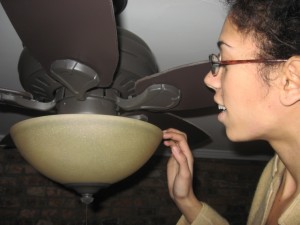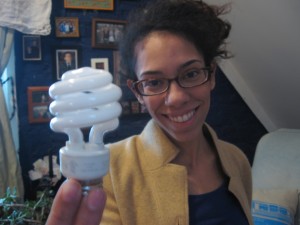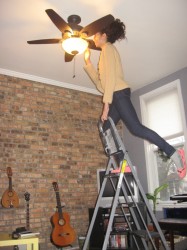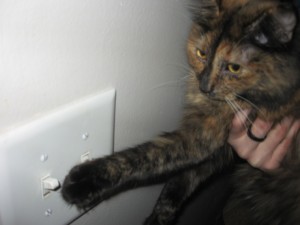Losing Big, Here at Home
Gaby Berkman
|January 17, 2012

This is a guest post by Page, Chicago regional educator.
So at this point, you’ve probably heard about Biggest Loser: Energy!
(It’s a really big deal)
But, in case you haven’t, Biggest Loser: Energy is ACE’s national competition that challenges Action Teams to reduce their school’s energy usage: Dropping pounds of CO2 and saving money in the process.
It’s awesome! It’s so awesome that I had to do it myself.
So I did Biggest Loser: Energy in my own apartment, here in Chicago with my housemates. We counted our lights and electronics, found the wattages, and estimated how often these things were left on.
In the process of doing this audit, we found a BUNCH of things that were being left on in our apartment or plugged in while not being used…and none of us had realized it! That’s right Energy Vampires were quietly sucking up electricity and costing me (and my housemates) a lot of money. 
Once we knew where the energy vampires were, we could stop them! So we started unplugging and turning off power switches. I even volunteered to do an energy sweep, where before going to sleep I went around to make sure everything was unplugged.
Sure, at first we needed a few reminders but by the end, it had become a habit! No big deal.
Success? YES! Our electricity bill noticeably went down! That’s awesome. Even more awesome, we lowered our CO2 emissions by 80%. That means that in the course of the next 6 months that we live here, we will have saved over 2,000 pounds of CO2 from being released into the atmosphere. So that’s good for me, my housemates, our wallets, and anyone affected by climate change (translation everyone…in the
world.).
AWESOME!
But YOU have even more opportunities when YOU take on Biggest Loser: Energy at your school. How Come? Well:
1. It’s a school! Your school has way more people and energy usage then my apartment. According the EPA, every year the schools in the U.S. pay, collectively, $6 billion on energy— that’s more than what the entire school system spends on textbooks and computers. Combined! AND that’s tens of billion pounds of CO2 warming the planet. But those big numbers mean more potential for big savings at your school! 
2. Since I recruited my housemates to help, it wasn’t just me who learned about energy conservation. I got 4 times as many people involved and learning about energy. And you can recruit your entire school to get on board with this! That’s a lot of knowledge being shared. Then students and teachers will spread the lessons about energy reduction to their families, friends, neighbors… You can have a huge impact through your school cus it’s a center of your community. That’s really powerful!
3. When you lower your school’s energy bills, that means there’s more money to go towards things that really matter – like….tools to improve your education, after school programs, clubs, sports, dances, all that good stuff.
4. If you go big enough and you drop the most pounds of CO2, then you are the winner. Which means, your team will get $1000 dollars from ACE! Not bad.
Did I mention Biggest Loser: Energy is awesome?
 Want in? Fantastic! Go to this website to sign up. That’ll get your team set and ready to lose big this semester. We’ll send you instructions on how to get started as well as your own, free Power Pack: full of tools and resources to help make losing easy!
Want in? Fantastic! Go to this website to sign up. That’ll get your team set and ready to lose big this semester. We’ll send you instructions on how to get started as well as your own, free Power Pack: full of tools and resources to help make losing easy!
If you’ve ever got any questions, send them to your ACE educator. We’re here to help!
Join our Youth Action Network
More Blog Posts
Driving India towards self sufficiency and freedom from oil
India can shield itself from oil-price shocks and global pressure over Russian barrels by leaning harder into two strengths it …
Read More
Unnatural, Not Unprecedented
For two weeks, residents of Southern California endured a waking nightmare. Parents raced against time – hurrying down the driveway …
Read MoreCrafting a Vision for the Future: My Experience at LCOY USA 2024
Dry and sunny Tempe, Arizona where temperatures have been over 100 F for 113 consecutive days, delegates gathered to attend …
Read More
